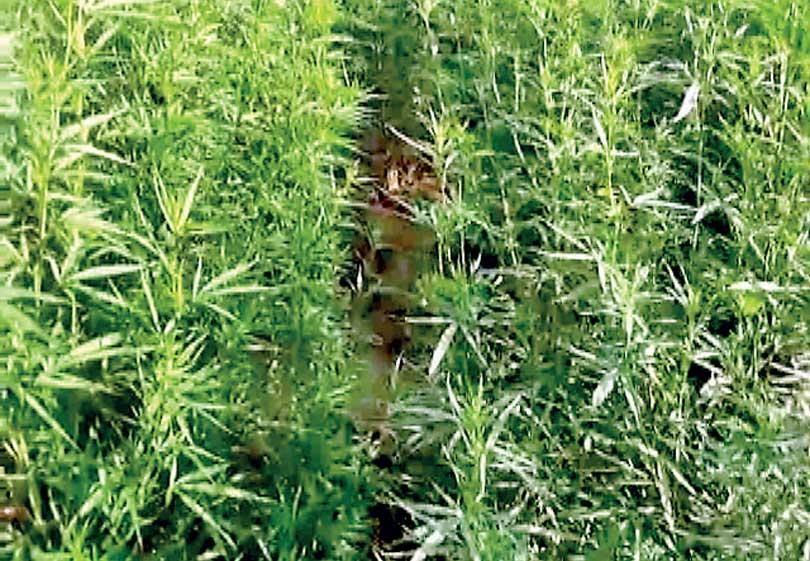08 Sep 2020 - {{hitsCtrl.values.hits}}

 There is a concentrated effort around the world to make cannabis use legal. Different types of strategies and themes are used in different countries to justify this. For example, in Canada it was the liberal ideology that was leveraged – that people have the right to make their own choices.
There is a concentrated effort around the world to make cannabis use legal. Different types of strategies and themes are used in different countries to justify this. For example, in Canada it was the liberal ideology that was leveraged – that people have the right to make their own choices.
In Sri Lanka it is the “desheeya” or local culture that is being used. This is not to say that a handful of those calling themselves “liberals” also want it legalised here. It is hard to see how dependence forming drugs liberate people. Those who are favourable to such ideologies are ruthlessly used as advocates sometimes unwittingly, to achieve this objective.
It is well established that cannabis causes many health harms. These harms have not occurred on a large scale because the number of users in each country during the recent past has been small.
When the of use cannabis and its derivatives become more widespread, we will begin to see harms of these substances occurring in a large scale. These include mental illnesses including depression and schizophrenia, poly-drug use, many types of lung diseases etc. We will even see some effects that are not seen now. For example, we are seeing many cancers caused by alcohol now, which was not on the traditional list of diseases caused by alcohol.
In Sri Lanka, if a larger number of people begin to use cannabis-derived products, the already unacceptable number of road traffic accidents, deaths and injuries will increase, as it has been shown in countries where cannabis use is increasing
In Sri Lanka, if a larger number of people begin to use cannabis-derived products, the already unacceptable number of road traffic accidents, deaths and injuries will increase, as it has been shown in countries where cannabis use is increasing. We will also see large scale spending on cannabis by the poorer segments (as for alcohol) leading to exacerbation of poverty.
But will cannabis use become widespread if legalisation occurs?
In locations where legalisation has taken place, the current small scale illegal trade of cannabis has become a big business with international connections. There are large cannabis companies operating now in several countries legally.
The world’s largest tobacco company has already invested billions of dollars on a large cannabis company in North America. The alcohol industry too has invested billions in cannabis companies.
It is apparent that the largest cannabis companies in the world will be owned by very large tobacco and alcohol industries. One can imagine the power they will wield over countries such as ours, going by our experiences with the tobacco and alcohol trade.
The alcohol industry is already experimenting with a cannabis-infused beer. Pharmaceutical companies and beverage companies such as Coca Cola are also working on cannabis-based products. Needless to say what the tobacco industry interest in cannabis is. Cannabis use through e-cigarettes is already happening in North America.
These businesses do not use the traditional or so-called “national” (if that is the word) cannabis that is grown in many parts of the world for their products. Genetically modified varieties of cannabis is used to increase its active chemical components to ensure that users are hooked and keep using it.
There will be nothing local or traditional about it. This will happen even in Sri Lanka making the “desheeya” advocates look foolish. Their vocal advocacy for allowing cultivation of cannabis, if successful, will result in multinational companies to growing genetically modified cannabis in Sri Lanka. Maybe some of them are aware that they are supporting this “videsheeya” agenda.
High concentrations of the principal psychoactive chemicals contained in cannabis is now synthetically manufactured. These too are marketed in countries where some level of legalisation is in place. Therefore, growing cannabis will become obsolete in the future.
Worldwide, there are very very few patients that benefit from cannabis related medicinal products as there are many other tried and tested medicines for the same illnesses that cannabis products have shown some sort of effect.
The evidence for efficacy even for these few indications are low to moderate. E.g. Chronic Pain (moderate), Multiple Sclerosis (not more effective than placebo), Treatment-Resistant Epilepsy (low), Nausea and Vomiting in Chemotherapy (low). So we can see that even the medicinal effects of components of the cannabis plant has been blown way out of proportion, even in western countries.
Just because chemicals present in the cannabis plant has been shown to have some effect in treating a handful of illnesses, it does not mean that use of cannabis should be legalised for the entire population to use.
Although we use close derivatives of heroin in western medicine (morphine, pethidine, etc.), heroin use is not legalised. It is similar to asking everyone to use morphine regardless of whether they need it to treat an illness or not. The Ayurvedic sector (along with the entertainment sector) has been ruthlessly used to promote the cultivation and use of cannabis. The excuse given is that some Ayurvedic preparations require cannabis. In Sri Lanka, cannabis cultivation, production and use is banned. However, it is permitted to use cannabis (Hemp) for medicinal purposes.
At the moment, there is a well-established system in the government that provides cannabis to such practitioners. If there is a shortage of cannabis to continue this system, we should look at how such a shortfall can be met.
Getting people to cultivate cannabis is not the solution to such a shortfall. In Sri Lanka, leakage of this product is inevitable, as the recent experiences related to heroin has amply illustrated. Importation by the Department of Ayurveda under strict conditions will be the most acceptable and practical solution. There is no legal bar to this at present.
Still, no one has provided credible proof that people of Sri Lanka are dying because there is a shortage of cannabis for Ayurvedic Medicine.
As far as this writer is aware, cannabis alone is not used as medicine in Ayurveda, but is used as a component along with other ingredients with some of its medicine. Also, Ayurveda does not prescribe inhalation of or smoking cannabis as a cure for any ailment. Ayurvedic professionals can comment on this.
We need to remember that tobacco was also at the same stage at the beginning of the last century. Large scale production and marketing has made tobacco the most destructive substance that mankind has produced, killing around 7 million people each year. Cannabis will keep adding to this number, while companies profit.
Psychological impacts of cannabis abuse
According to Dr. Jayamal De Silva, Consultant Psychiatrist, Colombo South Teaching Hospital, Kalubowila out of 100 young people around 6% will become psychotic. “They have a tendency to become schizophrenic and these psychological states may last for a long time. But there’s no way of knowing whether one becomes psychotic with cannabis. Other mental health issues include mood disorders, depression, manic episodes and severe anxieties. Panic disorders are also common where patients will show severe agitation and this would be precipitated by cannabis.”
He further said that cannabis will trigger severe unpleasant psychological experiences. “People will develop flashbacks and it could be debilitating to a point where they will be unable to work. Young people have a developing brain until they reach 25 years of age and cannabis will cause their IQ levels to drop. Cannabis is generally smoked after mixing with tobacco hence the unhealthy effects of tobacco will also be added. This will give rise to irritation in the respiratory tract and lung diseases. Research studies in the US and other countries have proven that intoxication due to cannabis is high among young people. Apart from that, the youth suicide rate is around 25% in places where cannabis has been legalised. This shows that cannabis has replaced the role of alcohol. This impairs people’s ability to make decisions, make them drowsy and has a direct link to the rise in road accidents.”
Speaking about treatments Dr. Silva further said that unless heavily used, people will not develop a physical dependence towards cannabis. “Hence there’s no specific drug to treat cannabis dependence. If somebody gives up cannabis there won’t be any life-threatening symptoms. But a person may experience several withdrawal effects including appetite changes, sleep disturbances and so on.”
He also stressed on the fact that cannabis use has increased in Sri Lanka. According to statistics revealed by the National Dangerous Drug Control Board there are approximately 300,000 cannabis usersin the country. “The usage is high since cannabis is being heavily promoted. There are more admissions to psychiatric in-ward facilities.”
He suggests that legitimate use should be restricted to Ayurveda use. “That also should be used by qualified practitioners. It should never be available as a recreational or over-the-counter drug. There’s an illicit industry even if there are regulations for alcohol. This disrupts societal harmony. Therefore even a legal could play havoc. The Rs. 1 people earn is spent in a ten-fold due to health and social consequences. If it’s made an over-the-counter it will set the precedent for a major health issue. Powerful multinational companies are promoting tobacco, alcohol and cannabis. So we need to look at all scientific evidence and have a broader picture of the issue at hand.”
Additional reporting
by Kamanthi Wickramasinghe
27 Nov 2024 5 hours ago
27 Nov 2024 6 hours ago
27 Nov 2024 7 hours ago
27 Nov 2024 7 hours ago
27 Nov 2024 7 hours ago